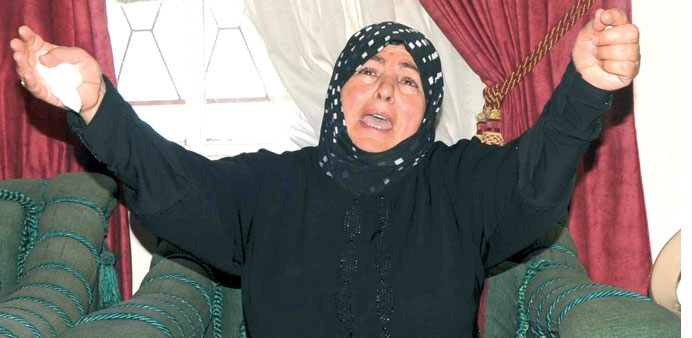Nadimeh, mother of Ali Mounzer, one of the three Lebanese soldiers who were killed at an army checkpoint, mourns his death in Riyaq village in the Bekaa Valley yesterday.
AFP/Damascus
Russia insisted yesterday it would deliver anti-aircraft missiles to war-torn Syria despite international criticism and a border-area attack killed three Lebanese soldiers, adding to growing fears of a wider conflict.
Israel warned it would act if the Russian delivery went ahead, and Syria’s top rebel commander gave Hezbollah, the powerful Lebanese Shia movement, a 24-hour ultimatum to stop fighting alongside regime forces.
The developments stoked tensions after the European Union decided to lift an embargo on weapons to Syria’s rebels, in a move the opposition reacted to with caution.
Syria’s regime joined its ally Russia in condemning the EU decision as an “obstruction” to peace efforts, while accusing the bloc of supporting and encouraging “terrorists”.
The US said it supports the EU move as a show of “full support” for the rebels, despite its own refusal to provide arms it fears will end up in jihadist hands.
Moscow said its plans to deliver to Damascus the S-300 missiles—designed to intercept aircraft or other missiles like Patriots Nato has already deployed on Turkey’s border with Syria—were part of existing contracts.
“We consider these supplies a stabilising factor,” deputy foreign minister Sergei Ryabkov said, adding they could act as deterrence against foreign intervention.
Israel has strongly objected to the delivery, and its defence minister warned of a response.
“The deliveries have not taken place, and I hope they do not. But if, by misfortune, they arrive in Syria, we will know what to do,” said Moshe Yaalon.
The Jewish state has reportedly carried out at least three strikes against Syria since the uprising against President Bashar al-Assad erupted in March 2011, apparently targeting weapons.
On the ground, the conflict has already spilled over into Lebanon, and in the latest incident three soldiers were killed in an attack near the northern border town of Arsal, where most people back Syria’s uprising.
And in the eastern Lebanese town of Hermel, security sources said six rockets apparently fired from Syria hit the Hezbollah stronghold, wounding seven people.
Hezbollah is allied with Syria’s regime and fighting alongside the army against the rebels, including in the central town of Qusayr, where it has lost dozens of men.
Its role has raised fears Lebanon could be dragged into the war, and rebel chief Salim Idriss warned his fighters would respond within 24 hours if the group failed to halt its intervention.
“If the attacks of Hezbollah against Syrian territory do not stop within 24 hours, we will take all measures to hunt Hezbollah, even in hell,” he told Al Arabiya news channel.
The tensions overshadowed an ongoing meeting in Istanbul of Syria’s opposition National Coalition, which responded cautiously to the EU’s decision to lift its arms embargo on the rebels.
“Definitely it is a positive step, but we are afraid it could be too little, too late,” spokesman Louay Safi told AFP.
The EU agreed on Monday to lift the embargo, but no member state intends to send any weapons immediately for fear of endangering prospects for a peace conference.
The move divided the 27-member bloc, with Britain and France in favour and Austria, the Czech Republic, Finland and Sweden reticent to pour more arms into a conflict that has already cost some 94,000 lives.
But even with the lifting of the embargo, countries are expected to hold off on sending weapons to the rebels to allow efforts to convene the peace conference dubbed Geneva 2 that Russia and the US are trying to organise as early as next month.
The opposition is still discussing whether to attend the conference, and Russia insisted yesterday that Iran—a key Assad backer—must be invited, despite Western reservations.
“The issue of Iran is key for us,” Russian media quoted Foreign Minister Sergei Lavrov as saying.
The delay in any decision to supply arms, potentially until another EU review on August 1, angered rebel fighters.
“Why wait another two months? So that the Syrian people continue to be subjected to genocide?” , rebel spokesman Qassem Saadeddine said.
Fighting continued to rage, including at the central prison in northern Aleppo, with the Syrian Observatory for Human Rights watchdog saying at least 86 people were killed across the country yesterday.

